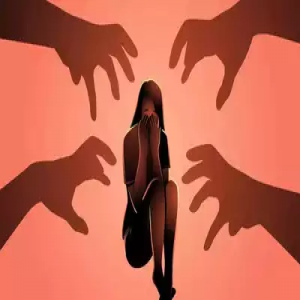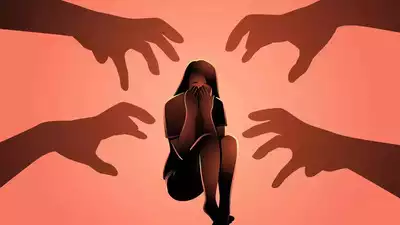
.jpg) Dr. Elsa Lycias Joel
Dr. Elsa Lycias Joel

"Boys will be boys. They make mistakes." What does this statement convey? That nobody should be held accountable for their sudden fetishes or perversions towards women? Come on, display some of that social consciousness that is bandied about so much in official and international speeches about how Indian women are revered as goddesses.
India may be booming, but not for all women. Two of the country's most serious challenges are how to address women's safety and how to deliver speedy justice. Twelve years ago, the whole world stood stunned. The victim was celebrated as Nirbhaya. How ridiculous to remember and address hapless victims with such titles! In reality, she would've gone through matchless pain and fear before she died a brutal death. By addressing victims with titles, who are we trying to comfort? People have come to recognise the reality long ago. It was those perverts who were fearless to commit a crime of that intensity with a heinous intent.
Around the time of the 2012 gang rape and murder, India recorded 24,923 rape cases, which is about 68.28 cases per day, as per the National Crime Records Bureau. So, should India be proud or ashamed of the thousands of 'Nirbhayas?' While it took years to punish the convicts, one walked out free and fearless with a new identity, a grant of 10,000 rupees and a sewing machine, only because he was a juvenile. Only after the rapist, the most brutal of all, got to walk free, the Juvenile Justice (Care and Protection of Children) Act was passed in 2015. It was then that I knew violence against women would never end. There is a clear pattern to the way the minds of rapists have evolved in our country, given the speed and manner in which amendments evolve, and justice is delivered. Timely justice may not be a panacea for all injustice that plagues us, but it could be a precursor to other reforms. Nothing but the severity of the punishment will act as a deterrent.
The current rape crisis speaks of something even more worrisome: a society that is out of touch with its women. By all accounts, the Indian women never had it so good. Due to the generosity of a patriarchal society, they are all flush with problems, much more they can handle. Citizens' protests that take various forms and shapes are indeed comforting. However, the fruits of women's safety or liberation cannot be allowed to be negated by a societal system that is striking at the very root of the country's well-being. Sensible recommendations made by committees and well-meaning individuals will not deter crimes unless they are acted upon in due earnestness. Salvaging even the process of justice from tangles of state intimidation or political pressure is a herculean task. At this juncture, I remember the Best Bakery case which had an unwavering bottom line to the tumultuous saga of the victim. It was in that landmark case that, for the first time, the apex court shifted the trial out of state.
The fear of being violated is so intense that Indian women can taste it. It is shameful that few public servants dare to declare that public spaces are not meant to be the right places for the right kind of women at the wrong time. When did a seminar hall in a medical college turn unsafe for a trainee doctor? Was she inappropriately clothed? What a handful of political elite say is not different from what a convicted criminal says. Enough is enough. As long as naming and shaming the victim continues, in addition to gracing them with unbefitting titles, violence against women in all forms will continue with a plight of pandemic proportions.
We have had enough such horror stories of rape, torture and murder that should make the legislature and executive give serious thought rather than analyse the uniqueness of each violation. What clumsy legislation have we got? Should it take 40 years for the Parliament to pass The Criminal Law (Amendment) Act 2013 to amend the IPC to allow the death penalty only in rape cases where the accompanying brutality leads to death or leaves the victim in a persistent vegetative state?
Aruna Ramchandra Shanbaug, an Indian nurse, lay in a vegetative state for almost 42 years after she was sodomised and strangulated with metal chains in 1973. Are rape laws far from adequate, or is a lack of willpower? Sohanlal Valmiki, the sodomist, must be caught and hanged if he is alive instead of celebrating Aruna for giving India a passive euthanasia law.
In 1972, a 16-year-old girl Mathura was raped inside a police station by two policemen who were set free by the court just because the victim wasn't injured. After 9 years, the anti-rape law was amended. I have every reason to assume that those two men in uniform would have had a free run until the law was amended. It is a pity that Justice AD Koshal, Justice Jaswant Singh and Justice PS Kailasam (J) in the bench who reversed the High Court ruling and again acquitted the accused policemen in 1979 were not aware or couldn't comprehend the irreversible damage they did, for decades to come.
The SC's verdict was based on the following three arguments:
• Mathura did not vocally express her non-consent during the ordeal.
• There was a lack of bruising on her body.
• She was 'habituated to sexual intercourse' based on the two-finger test.
We have umpteen days and nights to reclaim. Decades away from Mathura and Aruna tragedy, the pertinent question we ought to ask ourselves is how far have we come? Jyoti Singh, Zaheera, Moumita Debnath, Anjali Singh, Asifa and many more are not the only ones to have gone through such severe sexual assaults. 'Nirbhaya Juvenile' who assaulted 8-year-old Asifa was acquitted. How ridiculous! Rapists must be tarred with the same brush, no matter how old the victims are.
What is mystifying is the fact that gang-raping of someone below 18 years of age is considered a heinous offence punishable by death, whereas gang rape, torment and murder of an adult is not. Public outcry and protests can caution lawmakers against semantic hair-splitting on defining the nature of violence, warning that 'certain criteria' will remain a stumbling block in drafting a perfect statute with no loopholes.
Complacency should never cost us more promising lives. As for the law enforcement and investigative agencies, it is not too early to tell the real story of RG Kar Medical College and Hospital on August 9. So, forgive me, for this article's focal point, or raison d'être, is not just Dr Moumita Debnath alone. There are umpteen stories and latest updates on the Kolkata tragedy; many will find many opportunities to forecast and explore the factors that predict juries' decisions to convict or acquit rapists in the decades to come. What there won't be, however, is an opportunity to hear or know the truth.